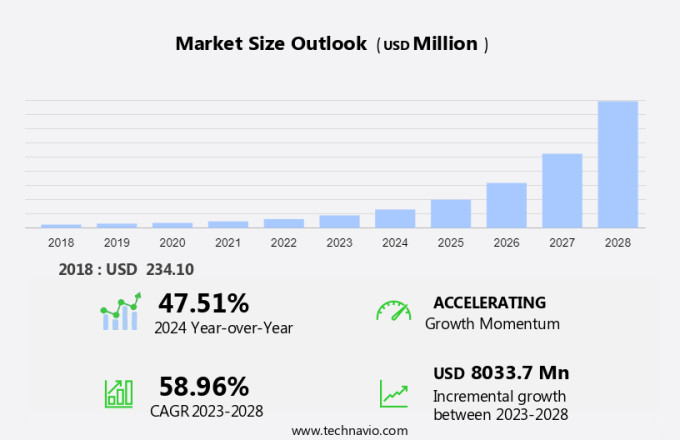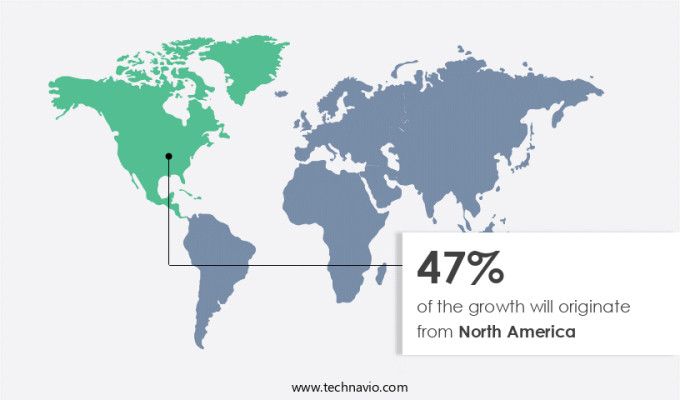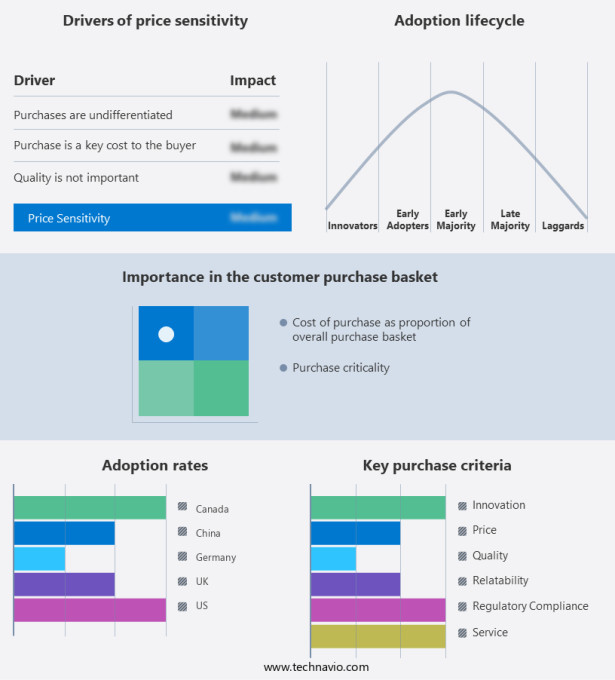Blockchain Technology In Healthcare Market Size 2024-2028
The blockchain technology in healthcare market size is forecast to increase by USD 8.03 billion at a CAGR of 58.96% between 2023 and 2028. Blockchain technology is revolutionizing the healthcare industry by offering enhanced security and transparency for medical records and patient histories. This technology enables secure data transactions through a decentralized system, ensuring that patient data is protected from financial losses due to theft or unauthorized access. The implementation of blockchain technology in healthcare can lead to revolutionary changes, including the creation of master patient indices for longitudinal records and an integrated workflow for seamless data exchange. The potential of the metaverse to create secure, great environments for healthcare applications is also being explored, enhancing patient engagement and data security. The merits of this technology extend beyond data security, as it also allows for informed consent and improved patient privacy management. The financial sector is also benefiting from blockchain technology through increased efficiency and reduced costs associated with traditional record-keeping methods. Overall, the adoption of blockchain technology in healthcare is a significant trend that is expected to continue, as the industry prioritizes data security and privacy while improving workflow and patient care.
What will be the Size of the Market During the Forecast Period?
Blockchain technology, a digital ledger system, is revolutionizing various industries, including healthcare, by providing a secure and accountable method for recording and transferring data. This technology, which utilizes computers, blocks, and databases, operates on a network of interconnected nodes that maintain a permanent and unchangeable record of transactions. In the healthcare sector, blockchain technology offers significant advantages over traditional methods for managing data. With increasing concerns over healthcare data breaches and counterfeit drugs, the need for a secure and immutable system is paramount. Blockchain technology provides this security by creating a decentralized database that is resistant to data leaks and tampering.
One application of blockchain technology in healthcare is the secure exchange of sensitive information, such as vaccination certificates and medical records. By utilizing this technology, healthcare providers can ensure the authenticity and accuracy of these records, while patients maintain control over their data. Additionally, blockchain technology can be used to trace the origin of medications, preventing the distribution of counterfeit drugs and ensuring the integrity of the supply chain. Another area where blockchain technology can make a difference is in the management of medical devices and hospital equipment. By creating a digital ledger of device history, maintenance records, and ownership, healthcare facilities can ensure that all equipment is up-to-date and functioning properly.
Also, this not only improves patient safety but also reduces costs by eliminating the need for unnecessary repairs and replacements. Furthermore, blockchain technology can also be used to facilitate transactions with non-traditional suppliers, such as those in developing countries. By creating a secure and transparent system for recording and verifying transactions, blockchain technology can help to build trust and increase efficiency in global supply chains. In conclusion, blockchain technology is transforming the healthcare industry by providing a secure and accountable method for recording and transferring data. From preventing healthcare data breaches and drug counterfeiting to improving the management of medical devices and facilitating transactions with non-traditional suppliers, the benefits of this technology are vast.
Market Segmentation
The market research report provides comprehensive data (region-wise segment analysis), with forecasts and estimates in "USD billion" for the period 2024-2028, as well as historical data from 2018-2022 for the following segments.
- Type
- Private
- Public
- Hybrid
- End-user
- Pharmaceutical and medical device companies
- Healthcare payers
- Healthcare providers
- Geography
- North America
- Canada
- US
- Europe
- Germany
- UK
- APAC
- China
- South America
- Middle East and Africa
- North America
By Type Insights
The private segment is estimated to witness significant growth during the forecast period. The implementation of blockchain technology in the healthcare sector is gaining traction in the United States, as businesses seek to enhance data security and patient privacy. Blockchain technology, which utilizes cryptographic algorithms and independent computers, offers immutability and transparency, making it an attractive solution for healthcare providers and payers. Sensitive healthcare data can be securely shared among authorized users through private blockchain networks, ensuring information leaks are minimized.
Moreover, private blockchains provide a controlled environment that adheres to data protection laws, making it an ideal solution for the healthcare industry. The benefits of blockchain technology extend beyond data security. It also offers improved data traceability, which is crucial in healthcare settings. For instance, it can help prevent counterfeit drugs from entering the supply chain, as each drug can be tracked from the manufacturer to the end consumer. Furthermore, private blockchains can facilitate the secure sharing of vaccination certificates and other critical health records. As the demand for improved patient outcomes, simplified operations, and secure data sharing continues to grow, the adoption of private blockchain solutions in the US healthcare sector is expected to increase.
Get a glance at the market share of various segments Request Free Sample
The private segment accounted for USD 88.70 million in 2018 and showed a gradual increase during the forecast period.
Regional Insights
North America is estimated to contribute 47% to the growth of the global market during the forecast period. Technavio's analysts have elaborately explained the regional trends and drivers that shape the market during the forecast period.
For more insights on the market share of various regions Request Free Sample
In North America, the adoption of blockchain technology in healthcare is gaining momentum. This decentralized digital ledger system offers enhanced security, accountability, and stability for managing and sharing sensitive healthcare data. With the increasing use of electronic health records (EHRs) and the sophistication of healthcare infrastructure, the need for secure and interoperable health data exchange is paramount. Strict data privacy laws further highlights the importance of protecting patient records from being hacked. Blockchain technology addresses these concerns by providing a secure and decentralized network for recording and verifying transactions. The prevalence of counterfeit medications and the focus on data security and privacy are additional reasons fueling the growth of blockchain technology in the healthcare sector in North America. This technology offers a reliable solution for maintaining a tamper-proof database, ensuring data integrity and confidentiality.
Our researchers analyzed the data with 2023 as the base year, along with the key drivers, trends, and challenges. A holistic analysis of drivers will help companies refine their marketing strategies to gain a competitive advantage.
Market Driver
Growing inclination toward data security is the key driver of the market. Blockchain technology is revolutionizing the healthcare industry by addressing the critical need for secure and confidential handling of patient data and research information. This technology enables a node network where data is distributed across a peer-to-peer network, ensuring data integrity and preventing unauthorized access. For instance, patients can have control over their medical records through blockchain-based systems like MedRec, which maintains the privacy and security of their data.
In the realm of clinical trials, Guardtime's KSI blockchain technology ensures the validity and authenticity of data by preventing fraudulent tampering. These applications of blockchain technology in healthcare provide significant enablers for precision medicine, therapies, and medicines, addressing research questions and meeting the evolving needs of the industry. By utilizing blockchain technology, healthcare organizations can safeguard sensitive data and build trust within the ecosystem.
Market Trends
The growing adoption of blockchain-based health information exchange is the upcoming trend in the market. In the healthcare sector, the implementation of blockchain technology is gaining momentum as organizations seek to enhance data security and privacy in line with regulations such as GDPR and HIPAA. This technology offers merits like immutable data transactions, enhanced security, and improved patient data management. Blockchain platforms are being developed to support master patient indices and longitudinal records, ensuring integrated workflow and enabling the sharing of compliance data. Financial losses due to theft and data breaches can be mitigated through blockchain's secure and decentralized nature.
Moreover, blockchain technology upholds informed consent, offering patients greater control over their medical records. By adhering to regulatory frameworks and employing privacy-enhancing methods like zero-knowledge proofs and safe multiparty computing, blockchain technology can foster trust and legal compliance in the healthcare industry.
Market Challenge
Patient data privacy and consent management is a key challenge affecting the market growth. Blockchain technology, which utilizes a distributed ledger and cryptographic hash functions, is gaining traction in the healthcare sector due to its potential to enhance data security and integrity. However, ensuring interoperability and patient privacy in a decentralized system poses a significant challenge. Patients expect control over their medical data, including genetic code and data from wearable devices and IoT, while adhering to regulations such as HIPAA and GDPR.
Moreover, balancing transparency and privacy is crucial to gain patient trust and market acceptance. Carefully designed privacy measures within blockchain applications can enable patients to selectively share their data with healthcare providers, thereby maintaining data security and integrity while respecting patient confidentiality. This approach is essential to overcome the challenge of privacy concerns and foster growth in the blockchain technology market within the healthcare industry.
Exclusive Customer Landscape
The market forecasting report includes the adoption lifecycle of the market, covering from the innovator's stage to the laggard's stage. It focuses on adoption rates in different regions based on penetration. Furthermore, the report also includes key purchase criteria and drivers of price sensitivity to help companies evaluate and develop their market growth analysis strategies.
Customer Landscape
Key Companies & Market Insights
Companies are implementing various strategies, such as strategic alliances, partnerships, mergers and acquisitions, geographical expansion, and product/service launches, to enhance their presence in the market.
BurstIQ LLC - The company offers blockchain technology such as the BurstIQ platform. It also offers a blockchain platform for the healthcare industry.
The market research and growth report includes detailed analyses of the competitive landscape of the market and information about key companies, including:
- Amgen Inc.
- Blockchain AI Solutions Ltd.
- Chronicled
- Embleema Inc.
- Equideum Health
- GuardTime OU
- Hashed Industries LLC
- Health Utility Network Inc.
- International Business Machines Corp.
- iSolve LLC
- Medicalchain SA
- Microsoft Corp.
- Novartis AG
- Oracle Corp.
- Patientory Inc.
- Proof.Works
- Qure.ai Technologies Pvt. Ltd.
- Sanofi SA
- United Health Group Inc.
Qualitative and quantitative analysis of companies has been conducted to help clients understand the wider business environment as well as the strengths and weaknesses of key market players. Data is qualitatively analyzed to categorize companies as pure play, category-focused, industry-focused, and diversified; it is quantitatively analyzed to categorize companies as dominant, leading, strong, tentative, and weak.
Research Analyst Overview
Blockchain technology, a digital ledger system, is revolutionizing the healthcare industry by providing stability and accountability through decentralized networks. This technology uses blocks, each containing a cryptographic hash of the previous block and a record of new transactions, to create a distributed database. The network users validate and record transactions, ensuring data integrity and immutability. The healthcare sector, with its vast amount of confidential data, requires a secure and reliable system to store patient records, therapies, medicines, and research data. Blockchain technology offers merits such as interoperability, data transaction security, and counterfeit drug prevention. The network's decentralized nature eliminates the need for a central authority, reducing the risk of information leaks and hacking.
Moreover, the use of cryptographic algorithms and independent computers ensures data security and confidentiality. Healthcare providers and payers can benefit from blockchain technology by streamlining workflows, improving data management, and enhancing data integrity. The technology also enables the integration of IoT devices and wearable devices, providing real-time patient data access. Blockchain technology's capabilities as a distributed ledger system offer potential solutions to healthcare's most pressing needs. From patient data security and informed consent to clinical trials and approval processes, blockchain technology is poised to bring revolutionary changes to the healthcare industry. The distributed nature of blockchain networks also allows for the inclusion of non-traditional suppliers and devices, such as hospitals, medications, and vaccination certificates, in the network.
The technology's potential to prevent fraud and counterfeit drugs, as well as its ability to store and manage genetic code, makes it an essential enabler for precision medicine. In conclusion, blockchain technology's merits, including data integrity, immutability, and decentralization, make it an ideal solution for the healthcare industry's complex data management needs. The technology's ability to prevent fraud, ensure data security, and enable interoperability offers significant potential for improving patient care and reducing financial losses due to information breaches and drug counterfeiting.
|
Market Scope |
|
|
Report Coverage |
Details |
|
Page number |
158 |
|
Base year |
2023 |
|
Historic period |
2018-2022 |
|
Forecast period |
2024-2028 |
|
Growth momentum & CAGR |
Accelerate at a CAGR of 58.96% |
|
Market growth 2024-2028 |
USD 8.03 billion |
|
Market structure |
Fragmented |
|
YoY growth 2023-2024(%) |
47.51 |
|
Regional analysis |
North America, Europe, APAC, South America, and Middle East and Africa |
|
Performing market contribution |
North America at 47% |
|
Key countries |
US, UK, China, Canada, and Germany |
|
Competitive landscape |
Leading Companies, Market Positioning of Companies, Competitive Strategies, and Industry Risks |
|
Key companies profiled |
Amgen Inc., Blockchain AI Solutions Ltd., BurstIQ LLC, Chronicled, Embleema Inc., Equideum Health, GuardTime OU, Hashed Industries LLC, Health Utility Network Inc., International Business Machines Corp., iSolve LLC, Medicalchain SA, Microsoft Corp., Novartis AG, Oracle Corp., Patientory Inc., Proof.Works, Qure.ai Technologies Pvt. Ltd., Sanofi SA, and United Health Group Inc. |
|
Market dynamics |
Parent market analysis, market growth inducers and obstacles, market forecast, fast-growing and slow-growing segment analysis, COVID-19 impact and recovery analysis and future consumer dynamics, market condition analysis for the forecast period |
|
Customization purview |
If our market report has not included the data that you are looking for, you can reach out to our analysts and get segments customized. |
What are the Key Data Covered in this Market Research and Growth Report?
- CAGR of the market during the forecast period
- Detailed information on factors that will drive the market growth and forecasting between 2024 and 2028
- Precise estimation of the size of the market and its contribution of the market in focus to the parent market
- Accurate predictions about upcoming market growth and trends and changes in consumer behaviour
- Growth of the market across North America, Europe, APAC, South America, and Middle East and Africa
- Thorough analysis of the market's competitive landscape and detailed information about companies
- Comprehensive analysis of factors that will challenge the growth of market companies
We can help! Our analysts can customize this market research report to meet your requirements. Get in touch




